The Beginning Of The End Of America’s Longest War
Last night, the President basically announced that America's longest war had entered it's end game.
Last night, in a brief address to the country, President Obama announced the beginning of a change in strategy in Afghanistan that will lead to a drawdown of 33,000 troops by the end of 2012, and a handover of control to the Afghan military by 2014:
WASHINGTON — President Obama declared Wednesday that the United States had largely achieved its goals in Afghanistan, setting in motion a substantial withdrawal of American troops in an acknowledgment of the shifting threat in the region and the fast-changing political and economic landscape in a war-weary America.
Asserting that the country that served as a base for the Sept. 11, 2001, attacks no longer represented a terrorist threat to the United States, Mr. Obama declared that the “tide of war is receding.” And in a blunt recognition of domestic economic strains, he said, “America, it is time to focus on nation-building here at home.”
Mr. Obama announced plans to withdraw 10,000 troops from Afghanistan by the end of this year. The remaining 20,000 troops from the 2009 “surge” of forces would leave by next summer, amounting to about a third of the 100,000 troops now in the country. He said the drawdown would continue “at a steady pace” until the United States handed over security to the Afghan authorities in 2014.
The troop reductions, which were decided after a short but fierce internal debate, will be both deeper and faster than the recommendations made by Mr. Obama’s military commanders, and they will come as the president faces relentless budget pressures, an increasingly restive American public and a re-election campaign next year.
Only hours after Mr. Obama spoke, President Nicolas Sarkozy of France said on Thursday that he would also begin drawing down the 4,000-strong French contingent in Afghanistan.
“Given the progress we have seen, France will begin a gradual withdrawal of reinforcement troops sent to Afghanistan, in a proportional manner and in a calendar comparable to the withdrawal of American reinforcements,” Mr. Sarkozy said in a statement issued by his office, Reuters reported.
Mr. Obama, speaking in businesslike tones during a 15-minute address from the East Room of the White House, talked of ending America’s longest war and of the painful lessons he thought could be taken from it. While justifying the nation’s decade-long commitment, he talked of “ending the war responsibly” and warned of the perils of overextending the military by sending large numbers of soldiers into combat. He acknowledged that huge challenges remained before an end to the conflict that has cost hundreds of billions of dollars and 1,500 American lives.
The withdrawals would begin winding down the military’s counterinsurgency strategy, which Mr. Obama adopted 18 months ago. Administration officials indicated that they now planned to place more emphasis on focused clandestine counterterrorism operations of the kind that killed Osama bin Laden, which the president cited as Exhibit A in the case for a substantial American troop reduction.
“We are starting this drawdown from a position of strength,” Mr. Obama said. “Al Qaeda is under more pressure than at any time since 9/11.” He said that an intense campaign of drone strikes and other covert operations in Pakistan had crippled Al Qaeda’s original network in the region, leaving its leaders either dead or pinned down in the rugged border between Pakistan and Afghanistan. Of 30 top Qaeda leaders identified by American intelligence, 20 have been killed in the last year and a half, administration officials said.
The reaction to the President’s speech has been about what you’d expect, although interestingly enough the field of Republicans vying to replace him is split on their reaction to the speech, and the President’s new strategy:
Obama’s former ambassador to China, Jon Huntsman, did not even wait until the speech began to put out a statementcalling for steeper troop drawdowns as part of “a focused counter-terror effort which requires significantly fewer boots on the ground than the President discussed tonight.”
“We need a safe but rapid withdrawal which encourages Afghans to assume responsibility, while leaving in place a strong counter intelligence and special forces effort proportionate to the threat,” Huntsman said. “The War on Terror is being fought against a global enemy, and it is critical that we have the resources to fight them wherever they’re found.”
But former Minnesota Gov. Tim Pawlenty argued that Obama was going too far, saying he found it “deeply concerning” that the president called for the United States to “responsibly end these wars.”
“He said we need to end the war, quote unquote, responsibly. When America goes to war, America needs to win,” Pawlenty said in an appearance on Fox News after the East Room address.
Rick Santorum, in a statement, also charged Obama with being unfocused on winning in Afghanistan, and said withdrawal was politically motivated.
“President Obama speaks of winding down our engagement in Afghanistan, but he does not emphasize the need for victory,” Santorum said. “Every American wants our brave men and women home safely, but we cannot let those who’ve given the last full measure die in vain by abandoning the gains we’ve made thus far.”
Former Massachusetts Gov. Mitt Romney staked out a middle ground, arguing against “an arbitrary timeline.”
“This decision should not be based on politics or economics,” Romney said. “America’s brave men and women in uniform have fought to achieve significant progress in Afghanistan, some having paid the ultimate price. I look forward to hearing the testimony of our military commanders in the days ahead.”
On the punditocracy side, The Washington Post’s Jennifer Rubin called the speech irresponsible:
President Obama gave a speech tonight that was aimed at re-election — not victory in Afghanistan. In doing so, he made clear that he doesn’t much care whether we accomplish our mission (making certain Afghanistan is not a safe haven for terrorists); his mission is ending a war so we can spend more money domestically. “It is time for nation building here at home,” he announced. Hearing that line, Rep. Nancy Pelosi (D-Calif.) must have been smiling broadly.
The number of troops to be withdrawn, 10,000 by year’s end, is not in and of itself disastrous. But what undermines our effort is Obama’s insistence that, thereafter, according to a strict timetable, we will steadily reduce forces and be out entirely by 2014. But what if conditions on the ground change? What if it took until 2015? Forget about it. His key date is 2012, when he plans to have brought out the full 33,000 troops that manned the surge. Oh, and there’s an election that year.
(…)
We are about to see who is serious about victory — yes, victory is the aim, not setting the speed record for retreat — and who is not. The president, as Bob Woodward put it, has been a reluctant commander in chief. Tonight he proved to be an irresponsible one.
Commentary’s Jonathan Tobin calls the speech a victory for the enemy:
President Obama’s announcement tonight he is ending the U.S. troop surge that helped stabilize the war in Afghanistan was a fulfillment of his 2009 promise the U.S. offensive would end this summer. At the time, Obama was rightly praised for his decision to re-commit to fighting the Taliban and al-Qaeda in Afghanistan and his refusal to allow that country to drift back into the control of the Islamists. But by sending the enemy a message America could be waited out, the president also gave them hope. Today, that hope is being renewed. The withdrawal of the surge forces against the advice of our military commanders may wind up breathing new life into the Taliban cause. If, as a result of this decision the Taliban regains the ground it lost since the surge, then we will look back at this speech as a victory for America’s enemies, not a political coup for Obama.
Rubin and Tobin are being foolish, as is Tim Pawlenty, when he said this last night on Fox News:
“Bill, I thought his speech tonight was deeply concerning. Look how he phrased the outcome of this war. He said we need to end the war ‘responsibly.’ When America goes to war, America needs to win. We need to close out the war successfully. And what that means now is not nation building. What it means is to follow General Petraeus’ advice and to get those security forces built up to the point where they can pick up the slack as we draw down.”
The drumbeat coming from the right in reaction to this speech seems to be that we need to stay in Afghanistan until we’ve achieved “victory,” but they are never clear on what “victory” actually means. The initial attack on Afghanistan in October 2001 was in retaliation for al Qaeda’s attack on the United States, and the fact that the Tailban were sheltering the terrorists who had attacked us. The goal was to destroy al Qaeda’s operational capability in that country and, in the end, depose the Taliban who had taken up arms in defense of the terrorists. To a large extent, those goals were achieved long ago and we’ve spent much of the past five years or so fighting to protect the corrupt government of Hamid Karazai from domestic opposition, which includes the Tailban and those tribal leaders who have allied with them. Meanwhile, al Qaeda has taken up residence in Pakistan, and has inspired satellite groups in Yemen and Somalia. Some of the men who fought alongside the Taliban and with the Iraqi insurgents are now fighting to overthrow the government in Libya, a fight we are aiding them in for reasons that nobody has clearly explained.
How, precisely, are American national interest being served if we continue committing ourselves to a mission that really involves trying to bring political stability to Afghanistan, a tribal society with a 23% literacy rate and a history of resisting efforts by outsiders to “civilize” them (just ask Alexander the Great, the British Empire, and the Soviet Union)? Conservatives who favor continued engagement in Afghanistan are never able to answer that question coherently. Instead, they usually just point to Iraq and say “we did it there, we can do it here.” What that argument forgets, of course, are the tremendous social, economic, and political differences between those two countries. A strategy that “works” in one country — and i would submit that the jury is still out on the ultimate success of our misadventure in Iraq — will not necessarily work in another. More importantly, even if there was a strategy that would “work” in Afghanistan, it wouldn’t necessarily be worth it to go forward with it. There are bigger problems facing us, from Pakistan to Yemen to Iran, and getting bogged down in the Afghan quagmire serves no purpose whatsoever.
The President’s decision to begin the process of disengaging from Afghanistan is long overdue but nonetheless welcome. We’ve done everything we can do in that country over the past ten years, it simply isn’t worth sacrificing more blood and treasure on a country that may be beyond fixing.
Here’s the President’s speech in case you missed it:
Visit msnbc.com for breaking news, world news, and news about the economy
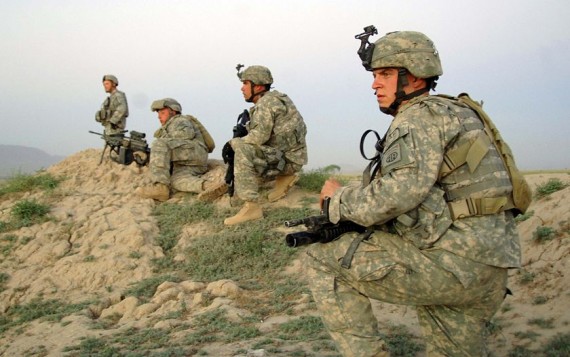

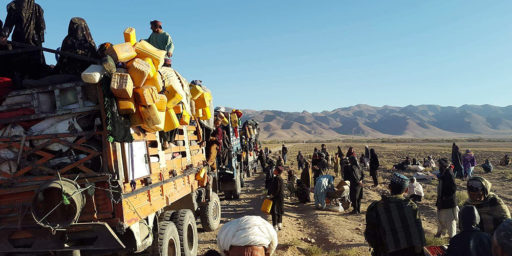
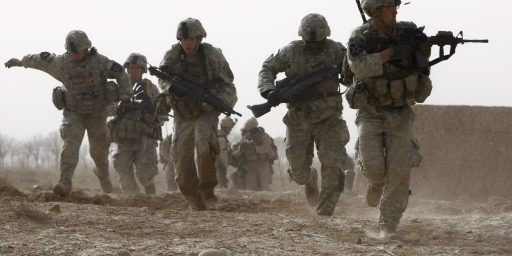
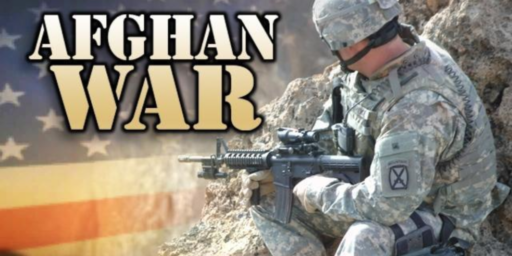
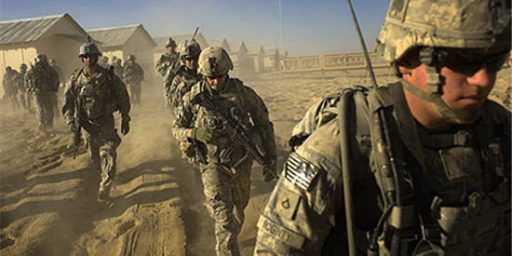
I thought this would be about the “war” on drugs.
Crap.
Technically we are still at a state of war with North Korea. mpw
Leaving Afghanistan may not be a pretty picture. It will leave a void, but, as said, there are other countries that will house terrorists just as well. Probably time to move on after so many years of blunders and a government that remains corrupt and no infrastructure. I think, while not perfect, intelligence and drones, will be our weapons in so many cases. There are many thorns in our side and as said, North Korea is still going on. Afghanistan will be thorn in our side whether we are there or not for the rest of our lives. Heck, the whole Middle East is a thorn in our side.
Well he has the extremes on both sides p’oed. Just like the rest of his Presidency he is operating right down the middle. Which is why I voted for him.
Frankly I wish Bush had taken out OBL at Tora Bora and then began a slow responsible withdrawal. But instead he went nation-building and left cleaning up his mess to the adults. So be it.
Pawlenty has some fantasy about “winning” and others want us all out immediately. Neither is reasonable. What Obama outlined last night is.
I’m glad both extremes are upset.
Being in the middle solely for the sake of being in the middle doesn’t always make sense.
I can understand (although I disagree with) the arguments for staying in Afghanistan.
I understand the arguments for pulling out as quickly as possible.
What I don’t get is Obama’s plan which doesn’t get us out, but also doesn’t leave enough people in to really accomplish anything.
With the 10 year anniversary of our half-assed invasion of Afghanistan rapidly approaching, he had to say something.
The folks who are only happy when America is slaughtering brown people will never be satisfied.
Yet again, the drumbeats for war, war, war are pounded loudest by those who bear the least of its cost.
Was this trip necessary?
How, precisely, are American national interests being served by retaining all but the 30,000 U. S. soldiers deployed to Afghanistan in the “Afghanistan Surge” beyond 2012?
So it seems the loudest voices are divided into two camps: withdraw completely immediately, and stay in force indefinitely.
Only the side that wants immediate withdrawal has consistent reasoning. The other side is split between neocons who think we can rebuild the world in our image, nation by nation, and those who simply oppose the president, no matter what he does. Seems most of the Republican presidential contenders fall into the latter category (Paul and Johnson are exceptions). Too bad they have no real principles.
mantis, there are also those unwilling to write off lives lost. It is sad, super-sad, that families were put in this position … but we should be honest that it was an error on the front-end, not the back.
mantis, there are also those unwilling to write off lives lost.
Sure, and I’m among them. I think we find ourselves in the quieter middle.
Yet another failure of war as delicate surgery.
I’ve been saying the same thing since the start of these two current wars: the American military is a sledgehammer not a scalpel. We have exactly one way to win a war: by crushing opponents with overwhelming force of arms, men and resources. That’s how we won the Civil War and our end of WW2. Our willingness to do same stopped the Soviets and held them in check until their disintegration. It’s how we lost (or drew) in Korea, Vietnam and still, I suspect, Iraq.
We are trying to civilize war and war won’t have it. If we don’t have the stomach for burning cities and starving populations and massacring enemies wholesale, then we should not have wars.
What we can do with all the Petraeus-era subtlety and our amazing technology is deny an opponent victory. But actual winning requires savagery. I’m not advocating that, I’m just saying this war-of-nuance and restraint is bullsh*t.
I think it’s the idea that wars can be “won” that is b.s.
Technology now makes even the smallest of resistance movements quite deadly.
Ponce:
They’re not deadly if they’re dead.
Nothing has really changed in guerilla warfare. The Apaches knew quite a bit about it even back in the 19th century. The Moro and the Seminole were quite adept as well. We live in a country that was almost all taken from other people. It’s still quite possible to take land from others. War still works. Just not this kind of war.
I’d say the ability of brown people to directly strike back at the people trying to slaughter them is new.
The Apaches never struck Washington, D.C. or New York City, or Madrid for that matter.
Americans don’t give a crap what kind of shit hole Afghanistan turns into after we leave.
They’re worried someone there will figure out how to use one of our nuclear power plants or LNG tankers against one of their poor little innocent cities.
You’re conflating terrorism with guerilla warfare.
And your insistence on talking about “brown people” is getting weird. You’re treating all Americans as white, (you do know we have black and hispanic and Asian soldiers, right?) and you’re tossing together dozens of diverse peoples, each with their own issues, and lumping them in by skin shade. I assure you that the Vietnamese are actually different from the Pashtuns and the the Pashtuns are not the Arabs and the Arabs are not the Filipinos or any of the dozens of the Native American tribes or any of the other people we’ve had battles with over the years.
As for a new and different ability by “brown people” to strike at us, you seem convinced that “we” are only New York City. Our soldiers and settlers and civilians, too, have been killed at various times by all manner of “brown people.”
Just so we’re clear: 9/11 wasn’t Afghans or Taliban, it was Arabs. And they were not put-upon little brown people, they were rich and middle-class ideological and religious fanatics from mostly Arab countries. I have not noticed that any of them were especially brown.
I don’t see a difference.
You yourself said it is a willingness to burn cities and starve populations that win wars.
Ponce:
Maybe you could look up the words, “terrorism,” and, “guerilla warfare.”
The meaning of words change, Michael.
It’s the people dropping the bombs or flying the airliners or detonating the nuke in downtown Tel Aviv who define them.
ponce:
That probably sounded profound in your head.
Nah.
Just sounded like the truth, Michael.
Slaughtering brown people is no longer a frictionless activity.
Ponce, you can’t get in the way of people rolling down the: Force can never fail, it can only be failed hill. I just note they rarely apply that logic to any other political commitment.